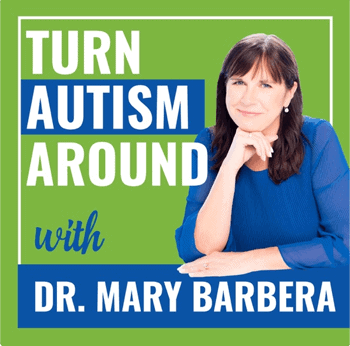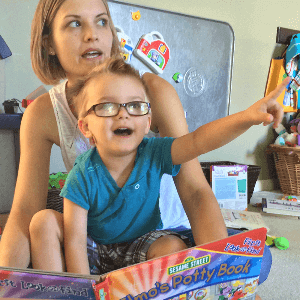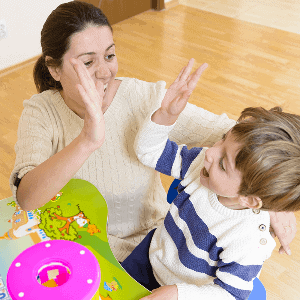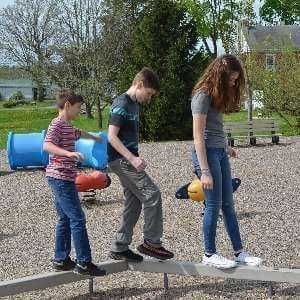When Lucas was a child, one day we realized that he had little wounds all over his leg, but they weren’t mosquito bites. And the next thing we knew, he had these strange verbal tics. As a trained nurse, I thought it was related to a medical issue because it came on so suddenly, so I started counting the verbal tics. I was able to count over 500 verbal tics in a day, so I knew that this wasn’t my imagination. It did end up being an infection, and with antibiotics, his tics cleared up.
The four steps of the Turn Autism Around approach are going to help you work through any medical issues that you face:
Step one: Assess to find out what problems you need to tackle.
Step two: Make a plan to teach your child what they need to do to stay healthy.
Step three: Teach: have practice sessions helping your child learn to swallow a pill or wear a mask or whatever the goals are.
Step four: Use easy data to see if you’re making any progress in helping them. Use a calendar to document changes in behavior, medications, and doctor visits.
I really stress the importance of teaching children to identify their body parts with Mr. Potato Head. After all, how can they tell you where they hurt if they don’t know the names of their body parts?
I wrote Turn Autism Around: An Action Guide For Parents of Young Children with Early Signs of Autism for moms like me. This is the book I needed when Lucas was five and still not potty-trained, or when he was ten and still not sleeping through the night in his own bed. This book is written for you using my perspective as a mom, a nurse, an advocate, and a behavior analyst, and I hope it helps you improve your child’s life.
Disclaimer: From time to time, BBC Materials may discuss topics related to health and medicine. This information is not advice and should not be treated as medical advice. The medical information provided in the BBC Materials is provided “as is” without any representations or warranties, express or implied. You must not rely on the information in the BBC Materials as an alternative to advice from your medical professional or healthcare provider. You should never delay seeking medical advice, disregard medical advice, or discontinue medical treatment for yourself or an individual in your care as a result of any information provided in the BBC Materials. All medical information in the BBC Materials is for informational purposes only. See our full terms at www.marybarbera.com/terms-2
YOU’LL LEARN
- The importance of keeping track of behaviors, medications, doctor visits, and medical tests as you figure out how to help your child.
- Strategies you can use to help a child on the spectrum communicate when they’re in pain and where that pain is located.
- Resources you can explore to help you improve your child’s eating habits, medicine consumption, and ability to talk about their body parts.
Attend a FREE Workshop!
RESOURCES
— Turn Autism Around
— MaryBarbera.com/workshop (Sign up for a free workshop online for parents and professionals)
— Indicating Your Child is in Pain
— When A Child with Autism Will Not Take Medicine
— Ruling Out Autism Medical Problems…Easier Said than Done!
— Autism Data Collection Method: Calendars
— #028: Autism & Medication with Dr. Michael Murray, Psychiatrist
— #045: Problem Behaviors Related to Pain and the Four Functions of Behavior
— #071: Dr. Missy Olive: Medical Conditions Associated with Autism
— #080: The Role of Functional Nutrition and Medicine in Autism
— #095: Dr. Keith Williams: Tackling Selective Eating in Children with Autism

Transcript for Podcast Episode: 121
Autism and Medical Issues: How medical issues impact problem behavior
Hosted by: Dr. Mary Barbera
Hi there, I'm Dr. Mary Barbera, and welcome back to another episode of the Turn Autism Around podcast. Today, we are talking all about medical issues in the autism world, how to get your child, the importance of ruling out medical issues, the importance of getting your child to describe when they're in pain, how you go about starting that, how to get your child to go to the doctor and get an ear check, or and then also how to get a child to take medication if that is prescribed. Lots of issues here. So let's get to it.
OK, so today we are talking all about medical issues. And for those of you that don't know me, I am in addition to being a mom of a son with autism, as well as a board-certified behavior analyst, author, online course creator. I've also been a registered nurse since the mid nineteen eighties, and I know I'm sounding very old as I say that, but I think because of my nursing background, that has really made me a better behavior analyst, a better mom, a better detective on our journey, specifically with Lucas, but also for many, many of my clients.
While my new book, Turn Autism Around, doesn't have a whole chapter on medical issues and medication use and teach your child to tell you they're in pain. I do mention medical issues a lot in this book, and I do believe it is part of the puzzle for sure. So today I just wanted to go over the four-step term autism around approach and how we can begin to make progress in all of the medical problems that might come along with autism or even signs of autism. And we're going to work through those four steps. And I'm going to tell you, hopefully some tips to start turning things around medically. And a lot of times that's tied to also turning things around behaviorally. So I have done previous video blogs on all of these issues. Ruling out medical causes is I think the blog says, something like easier said than done because it is quite complicated. I did a video blog about how to teach your child to tell you they're in pain. I'm going to summarize all these video blogs here.
I have another video blog on teaching your child to take medication. I also have a couple of podcasts that are more medical, namely one of my favorites that I mentioned all the time with Dr. Michael Murray, who's both a dad to a son with autism, as well as he's a psychiatrist and he's Lucas's psychiatrist. He's podcast number twenty-eight. I also did podcasts and we talked about medical issues with Dr. Melissa Olive, who's a board-certified behavior analyst, and Denise Voight, who is a nutritionist and a functional medicine nutritionist. So you can check out those video blogs and podcast. Those will be in the show notes. But let me just summarize, because I think we have limited time to be going out and watching all these video blogs and trying to put it together. Plus, it's been a couple of years since some of these video blogs and podcasts were recorded.
So in the past year, we've had to deal with a lot of medical issues and a lot of covid testing. For instance, a lot of mask wearing, some supplements have shown to be quite effective in helping kids and adults prevent serious illness. And so you might be reading about that or talking to your child's doctor or nutritionist and you might be wanting your child to take even simple multivitamins and you have no way to get in that medication and also the importance of food and nutrition. And that is definitely covered in my book. I have a whole chapter on feeding and picky eating, and that will be really helpful, too. So it's a problem across many kids, many areas.
So before we get into the four steps of how you begin to solve medical issues and all of these issues that come along with it. I want to tell you a couple of stories. First of all, Lucas, when he was about six years old, he started the first thing I noticed was he had open lesions on his legs like mosquito bites that he had picked open, but it was June, nobody else had mosquito bites. It was weird that all of a sudden he had kind of multiple open sores on his legs. A few days later, I noticed that Lucas began to have some motor tics. The one day he would go then and he would jerk his head to his shoulder and have this little vocal tic. And I didn't know what it was. He was six years old. So this is 15. I can't do the math. It's 18 years ago. So I was kind of perplexed. I was thinking, are these lesions related to these? This looks like tics to me, motor tics. So I began searching on the Internet, which thank God was a thing then. It wasn't really a thing back when Lucas was diagnosed, but I was searching for motor tics, acute onset, because this came out of the blue, you know, right away. People are like, well, maybe he has Tourette's, which is a tic disorder.
But, you know, as a nurse, any behavior and I was a behavior analyst by this point, any behavior that goes up, suddenly you have to think I was actually training to become a behavior analyst. You have to think like it's a medical issue. Like all of a sudden if your six-year-old starts having hundreds of tics a day, to me that seems like a medical issue. If all of a sudden Lucas starts banging his head on hard surfaces 50 times a day like that's, you have to think medical. Most behavioral analysts and behavior people think behavior right away. And I think medical right away, especially with something that's coming on acutely. So I searched and I found this thing called pans, P-A-N-S which stands for well, I actually found Panda's first and A. S, and it stands for pediatric autoimmune neuropsychiatric disorder associated with strep. Like strep throat, strep. But strep doesn't have to just be in your throat. Strep could be anywhere on your body, which I didn't know as a nurse.
So anyway, my husband is a physician and we discussed maybe a, like I'm thinking the lesions on his legs look like maybe a staph infection, you know this is talking about strep. And I knew Lucas had gotten to had taken a certain antibiotic. So that was kind of the treatment. And so we got Lucas on a five day course of antibiotics. And before we did that, we actually got out a clicker counter and we began to click every time you tick. Now, I have talked in the past about in my early in my career as a behavior analyst, I would get a clicker counter and I would count problem behaviors like aggression, self-injurious behavior. And now I really keep the clicker not for problems. I keep the clicker for positive things like words heard and that sort of thing. However, it was a long time ago, so I'm still using the click of a problem behaviors. And they were happening really frequently. So if I was trying to tally, it wouldn't be very helpful.
So we did click and we got five hundred ticks a day. So he was having a lot. We put them on antibiotics for five days, just a five-day antibiotic course. His leg lesions cleared up and his tics went down to zero. So now people might say, like, I don't believe in pans or pandas. It was kind of a newer thing in the late nineteen nineties. It's not just affecting kids with autism. There's a really good book called Saving Sammy and another book by the same author, Beth, forgetting her last name. But I'm actually having Beth come on the podcast in the spring later. Soon. I'm trying to get her on because she's really a wealth of information. But anyway, we controlled his tics and he went on to need more treatment for his tics that started at the age of six. Around maybe when Lucas was eight or ten, when I had been dealing with PANS and pandas. Oh, they made the name now PANS pediatric autoimmune neuropsychiatric syndrome. Because what the latest research shows is that it doesn't have to be strep. It can also be staph, mycoplasma, Lyme.
There's many bacteria that can cause tics, acute onset. And or an exacerbation or acute onset obsessive compulsive disorder, but at the same time that Lucas was having tics, he also began to be aggressive. He bit for the first time since you've been to and was really his tics were progressing. So that like the next day before we started the antibiotics, it was like really bad, like really exaggerated motor tics that were getting worse and worse. So we managed to get this settled down. And after a couple of years of experience under my belt with pans, I was consulting in a classroom and the staff called me and they said, I know you're coming in tomorrow, but we're having problems with this boy who I'd known for many years. And he was about eight, I'd say, and he was in a regular public school, but he had been in an ABA verbal behavior type of classroom for most of the day.
And I had known we'll call him Nick. And they said he's like peeing in the corner of the classroom and he's being really out of control. And I'm like, whoa. This is not, he had higher language than Lucas and he didn't have problem behavior. So what was this all about? And so when I went in to see Nick well, to see the classroom the next day, I was already scheduled. What I noticed with Nick was throat clearing. And a lot like many times a minute as well as I blinking where he was forcefully blinking his eyes really hard. And I was like as soon as I saw him, I was thinking, these are tics. He probably has pandas or PANS. And so we got data. It was hundreds of times an hour of both the throat clears and the and the eye blinks. And Mom was able to take him to the doctor, get them on antibiotics and resolve his problems as well.
So those were some of the early PANS, PANDAS problems then. Fast forward, when Lucas was a teenager, he began having more self-injurious behavior, more aggression, and they were almost always related to pain. Lucas being in pain or being startled. And he was big, he was over two hundred pounds at that point, and it was really scary time because I had gone to many physicians trying to get help. I was trying people were saying, well, you're going to have to put a helmet on or maybe it's puberty or, you know, and I was just thinking, or you need antipsychotic drugs. And me as a nurse realized I just knew that this was so sporadic and so pinpointed to pain or startle that I didn't want to put him on medication to, like, zone out the whole day.
And so we finally found Dr. Michael Murray who's on episode number twenty eight, and he diagnosed Lucas' with an autonomic nervous system dysfunction. I was like had my PANS in my mind, and that is pain and startle and having problem behaviors. And there's just a lot of other things that other symptoms of autonomic nervous system dysfunction. But basically Lucas's level of excitement, stress, everything was way above where everybody else was. So it didn't take much for him to get startled or pain to have him go into a fight or flight mode. You may have heard about that fight or flight mode. So flight means you pass out, you exit the scene. You you're just like. You fly away, but fight means you are aggressive, so if you are in pain or startled, you have a fight mode like you're being attacked, you would fight back. And so, Lucas', the pain was so bad that he would go into fight mode.
So with the medication, which was ended up being a cardiac medication that Lucas has been on since the age of 18, it's his problem behaviors well controlled, his autonomic nervous dysfunction is well controlled and he's doing exceptionally well. So those are stories I know they kind of went a little long, but I think it's important to know that kids can have medical problems that can cause behavioral issues. It could cause Nick to pee in the corner of the classroom and his issues all resolved, his eye blinking went away, his throat clearing went away, and his bizarre behavior went away as well. With Lucas, we treated medical problems. Those weren't the only two medical problems along the way, but those were the two biggies that if I wouldn't have been able to figure it out, it would have been even I mean, I can't imagine if we wouldn't have been able to figure those things out.
So I do think that a lot of our kids on the spectrum, especially kids, can't really tell us they're in pain, are having pain and having medical issues that we need to be diving a lot deeper. And I also did a podcast episode with Dr. Timothy Bulmer, who's a well-known researcher in the autism arena. And we talked a lot about biting. And when kids bite, he's a believer that it is probably due to pain or stress of some nature. So you may want to listen to that podcast as well. We'll put that in the show notes. So what are you to do if you have a child or a young child showing signs of autism or an older child with moderate severe autism who's not fully communicating?
I mean, thank goodness Lucas can tell us head hurts, belly hurts, neck hurts, whatever. He can tell us the basics, but he can't say the pain starts here. It goes down to my ear. It's a stabbing pain. He can't tell us any of that. So many kids can't tell us any of that. And so we just assume that it's puberty or anxiety or some behavioral issue when it is actually pain or stress. OK, so let's take the four step turn autism around approach just to walk you through what you should do, even if you don't think it's a medical problem, it might be and you might come across it to be a medical problem. So assessment is, number one, the first step of the Turn Autism Around approach. And we need to really assess whether we are taking a clicker counter and counting the number of tics, whether we are saying whether we are using our calendar, which is described in my book. I also did a video blog on my calendar system where we are recording problem behaviors. We're recording medication changes, we're recording supplements, added blood draws, doctors' visits. If a child is overweight, we're recording the weight. If the child has sleep problems, we might be recording sleep.
The calendar is a big part of our assessment. It's also a big part of the fourth step, which is evaluation, using data. And a lot of these steps kind of roll together. So assessing not just the child's language and their problem behaviors and their imitation skills and their matching, but we are assessing. Did you go to the doctor or did they check hearing, did they check allergies, does he have a diagnosis? Do they have a blood draw to rule out lead levels being too high or nutritional deficiencies? At my podcast with Dr. Keith Williams, episode number ninety-five is a real eye opener, too, because he's seeing now just in the past couple of years, he's seeing cases, multiple cases of scurvy and rickets and all kinds of things from major nutritional deficiencies in our kids. That's not something you can treat behaviorally. We have to involve medical professionals. So that assessment is so key.
The second step is to make a plan. If you want to teach your child to take medications or tolerate a mask or tolerate a test or tolerate your check or a blood draw, we're going to have to make a plan of where we're going to practice and how we're going to break down the steps, what we're going to do, because just fingers crossed, maybe next time the blood draw will go better is not a plan. And to do it while a child's crying or to hold the child down will have detrimental effects longer term. And it may roll over into problem behaviors in other areas. So making a plan, setting some goals, the third step.
So the first step is assessment. Second step is plan. Third step is teaching or intervening. We're going to have to have practice sessions for your child to tolerate pills swallowing medication. In my medication video blog, I talk about how when we started pills swallowing with Lucas, we used applesauce and dunked a small little pill and he swallowed it. And now, still today, Lucas takes all of his medications. He dunks them himself in applesauce. So we need to, like, fade in all of our demands and have strong reinforcements. Too much for me to cover today. But that's the third step, is to teach and to intervene with teaching children how to tolerate medications and procedures. I will say that part of the teaching to get children to tell you they're in pain is to get children to touch and label body parts on command.
And in my book, in my online courses, I, I really stress the importance of potato head and identifying body parts, because if they can't touch a body part like touch belly, they can't touch belly or if they can talk, if they can't label this is a nose versus this is ear versus this is neck, we're going to be a father much farther away from them being able to label pain. So may want to watch that video blog on how to get your child to tell you they're in pain. And then the fourth step of the Turn Autism Around approach is to use easy data to evaluate whether you're making progress. Like if I wouldn't have gotten that baseline data on Lucas with five hundred clicks for his tics before we started up for a couple of days before we started antibiotics and written it down somewhere, I would not have known, but I didn't start my calendar system back then. I started my calendar system probably a decade ago, which is still a long time.
And this calendar system where we write down any self-injurious behavior, any headaches, any Motrin, any allergy shots, any doctor's appointments, any antibiotics, Lucas still will have tics sometimes, and we have to write them down. His tics now don't look like his tics did when he was little. He actually has burping tics. When he gets a pans or sinus infection, he'll get burping tics. So we record those, we count those and we treat if needed through our physician. So that is what I got for you today in terms of ruling out medical problems, treating medical problems, really helping kids reach surplus potential by not just narrowly focusing on the behavior or academics, but we really want kids eating better, sleeping better, communicating better, low problem behaviors. And that is all in my brand-new book, Turn Autism Around.
This is the book I needed when my husband first mentioned the possibility of autism when Lucas was twenty-one months. This is the book I needed when Lucas got diagnosed with moderate to severe autism at age three. This is the book I needed when he was five and still not potty trained completely when he was ten and had never slept through the night in his own bed. This is a book written from my experience as a nurse, as a mom, as an advocate and as a behavior analyst, so I hope you'll get the book if you haven't ordered already. Download all the book resources at Turn Autism Around dot come. And I hope you enjoyed this episode all about medical issues in the autism world. And I'll catch you next time.
Sign up to receive email updates
Enter your name and email address below and I'll send you periodic updates about the podcast.






